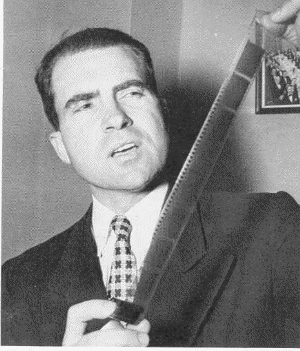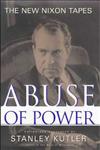Richard Nixon offers a detailed account of his role in the Hiss case in the first chapter of his book Six Crises. Not surprisingly, Six Crises presents Richard Nixon in a highly positive light--often overstating his role. Historians have criticized Nixon for several factual errors that appear in the Hiss chapter.
More interesting, perhaps, are Nixon's spontaneous and less guarded references to the Hiss case revealed in the White House tapes that played such a critical role in the Watergate scandal. It is apparent from the frequent references to the case that Nixon kept turning to 1948 for lessons on how to deal with the crisis that deepened in the White House from 1971 to 1973.

1971
Nixon, drawing from his experience in the Hiss case, on how to proceed against Daniel Ellsberg, the man who leaked "The Pentagon Papers":
"We won the Hiss case in the papers. We did. I had to leak stuff all over the place. Because the Justice Department would not prosecute it. Hoover didn't even cooperate. It was won in the papers. We have to develop a program, a program for leaking out information. We're destroying these people in the papers."
"I had Hiss convicted before he got to the grand jury....I no longer have the energy, [but we need] a son of a bitch who will work his butt off and do it dishonorably. I know how to play the game and we're going to play it."
[July 1, 1971]
"[In the Hiss case] they were all against me. We never got a thing [a leak] out of the grand jury until they indicted."
[July 2, 1971]
1972
President Nixon also turned to the Hiss case in 1972, when the Watergate scandal began to develop. He lectured aide John Ehrlichman on the meaning of the Hiss case:
"If you cover up, you're going to get caught. And if you lie you're going to be guilty of perjury. Now basically that was the whole story of the Hiss case. It is not the issue that will harm you; it is the cover-up that is damaging."
[July 19, 1972]
1973
When the Senate Judiciary Committee decided to hold hearings on Watergate, Nixon was bitter. He remembered that, in 1948, once the grand jury indicted Hiss, HUAC brought its investigation to an end. He thought the same should happen now, after convictions of those involved in the break-in and cover-up. Speaking to Henry Kissinger, Nixon asked:
"Where are your Harvard friends now? These assholes are saying: 'Oh no, the grand jury isn't enough, the court finding seven people guilty isn't enough. It's got to be now try it before a kangaroo court before the Ervin committee. There's a double standard. The only thing is to fight it."
The same day, to Secretary of State Rogers:
"....[A congressional committee] destroys a man's character in public and, second, if a file is turned over; you know, they will prosecute the poor guy....We did it to Hiss."
To aides Robert Haldeman and Charles Colson:
"...You know the great thing about--I got to say for Hiss. He never ratted on anybody else. Never. He never ratted."
Nixon discussed the Hiss case with aide John Dean:
"Hoover, himself, who's a friend of mine, said: 'I am sorry. I have been ordered not to cooperate with you.' And they didn't give us one --- thing. I conducted that investigation with two...committee investigators. That stupid--they were tenacious."
"But we broke that thing...without any help. The FBI got the evidence which eventually-- See, we got the Piper [Hiss's attorney, William Marbury of the Piper law firm?**] who--We got the, the, oh, Pumpkin Papers, for instance. We got all of that ourselves... The FBI did not cooperate. The Justice Department did not cooperate."
[February 28, 1973]
** In an earlier version of the transcript, prepared by the White House and believed to be less accurate than the transcription prepared by the House Judiciary Committee, "we got the Piper" is reported as "we got the typewriter." Supporters of Hiss seized on that statement as evidence that Nixon and HUAC investigators built the typewriter used as evidence to convict Hiss.
Source:

Stanley I. Kutler,
Abuse of Power: The New Nixon Tapes
(Simon & Schuster, 1997)
